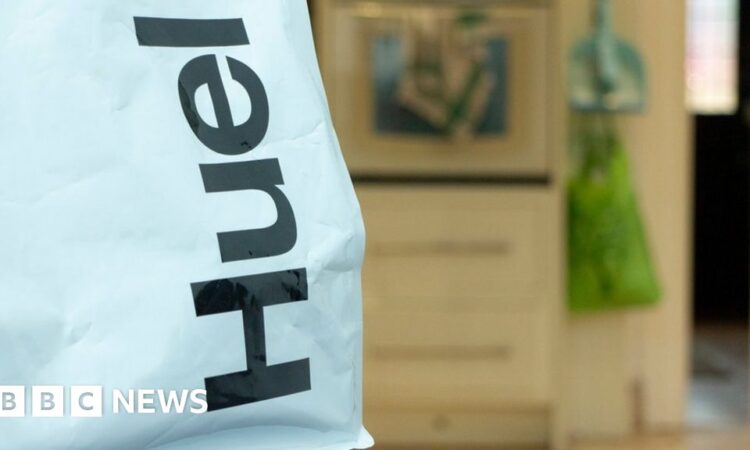
- By Tom Espiner & Simon Read
- Business reporters
Image source, Shutterstock
Adverts that suggested Huel meal replacement shakes could save people money on their food bills have been banned for being misleading.
As the cost of living crisis hit, one Facebook ad claimed that “Huel helps keep money in your pockets”.
But Huel did not show its products were cheaper than traditional food, the Advertising Standards Authority said.
The firm, which has pulled the ads, said it took its advertising responsibilities seriously.
Huel was founded by entrepreneurs Julian Hearn and James Collier who named it by combining “human” and “fuel”.
It claims when mixed with water its powders provide “complete nutrition”, are a healthy alternative to traditional meals and can “help you lose, gain, or maintain weight”.
The company runs paid social media partnerships with fitness influencers and encourages its customers to call themselves “Hueligans”.
In December it announced investment by actor Idris Elba, presenter Jonathan Ross and social media influencer Grace Beverley, founder of fitness brands Tala and Shreddy.
Cost claims
A Huel advert which ran on Facebook in August and September 2022 claimed that Huel “helps keep money in your pockets”, adding that a month’s worth cost less than £50.
A second advert on the firm’s website also claimed that Huel could help “save money on food”.
Image source, Getty Images
Actor Idris Elba has invested in Huel
“The ads were seen at a time of worsening financial crisis, during which increasing energy and food costs, as well as rising inflation, were having a significant impact on people in the UK,” the ASA said.
The watchdog ruled that Huel didn’t make it clear enough that the £50 claim was based on having one meal replacement per day.
To get the recommended amount of calories for a day, an average woman would have to eat five Huel portions, the ASA added.
That would cost about £350 a month, while an average man would need to eat more.
Separately, Huel claimed to be a “healthy option” without backing that up, the watchdog said.
Huel said it did not believe the ads were misleading, and “regretted any confusion that may have been perceived by their ads”.
It added that the £50 claim was made on the basis of having 34 Huel meals per month, at a cost of £1.51 per meal. This was mentioned in text at the bottom of the ad, albeit in a way the ASA found unclear.
The firm said it had never claimed Huel shakes should replace all of a person’s meals.
Separately, the Electrical Safety First charity has made complaints to the ASA about adverts for heating products its claims are dangerous.
The ads were trying to attract customers squeezed by cost-of-living pressures by saying the heaters could help save on energy bills.
But Electrical Safety First found heaters branded Keilini, HeatPal and InstaHeat “posed a serious risk of electric shock, with mains plugs not meeting the necessary UK safety standards”.
It said on two of the heaters the plug pins snapped easily, and the Keilini-branded heater did not have a UK plug at all, but instead an EU mains plug with an adaptor.
It said this was unsuitable due to a lack of fuse, creating a fire risk.
Lesley Rudd, chief executive of the charity, said it was “callous that these sellers are pushing dangerous products they know are going to be sought after by hard-up households during an energy crisis”.
The firms were contacted by the BBC for comment.
There is also a firm that runs an “Instaheat UK” website which sells patio heaters. This firm said it was unconnected to the portable heaters branded “Instaheat”.






